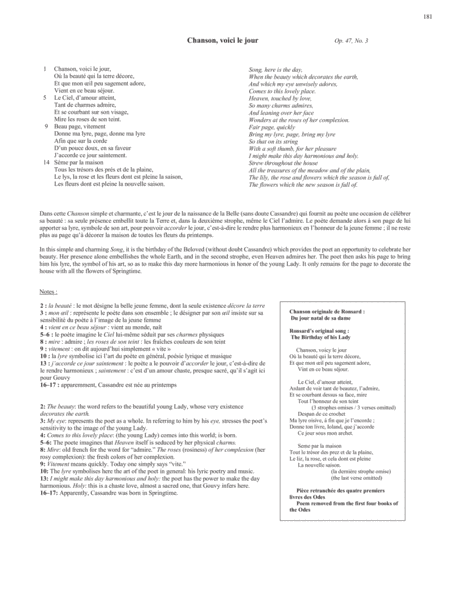Voice and piano (2 songs with violoncello; 1 vocal duet) - Medium - Digital Download SKU: MQ.8491-36E Composed by MeeAe Cecilia Nam and Theodore Gouvy. 5 pages. E. C. Schirmer Music Company - Digital #8491-36E. Published by E. C. Schirmer Music Company - Digital (MQ.8491-36E). French.A French composer, Th√©odore Gouvy (1819-1898) was one of the most significant composers of 19th Century in Europe. The movement of rediscovering his instrumental music has been increasingly successful in Europe since the 1990s, especially following the birth of L‚ÄôInstitut Gouvy in France. However, his solo vocal music has been waiting to be unveiled to the public. Volume One includes 52 songs of Gouvy.Gouvy traveled widely throughout Europe. He was also a lover of nature. Generally, he spent his winters in Leipzig, but in the summertime, he always returned to Hombourg-Haut, France, to stroll through the woods, to hunt, and to relax. Gouvy was fluent in several languages and had a great appreciation of the Renaissance French Poetry of Pierre de Ronsard whose poetry he had set to music. The fifty-two songs in this volume are largely by Ronsard and other Renaissance poets of La Pl√©iade.Although Ronsard is approximately 300 years older than Gouvy, they both seem to have the same interest in classical literature, though, admittedly, for different reasons. Celebrated by the French and English courts, Ronsard (1525-1585) was the leader of La Pl√©iade: a group of seven poets (Joachim Du Bellay (1522-1560), R√©my Belleau (1528-1577), √Čtienne Jodelle (1532-1573), Pontus de Tyard (1521-1603), Jean‚ÄďAntoine Ba√Įf (1532-1589), and Jean Daurat (1508-1588), who dedicated their efforts to writing poetry in French rather than in Latin (or Greek) as most of the Romantic poets did. They wished to enrich the French language, and establish a new literature which would be the equal of the other literature of their period, and the equal to poets of the past. French Romantic poetry featured the closeness of the poet to nature, and his ability to communicate with nature by personifying (anthropomorphizing) all of nature‚Äôs elements: flowers, the planets, the moon, the breeze, and even the sand upon the shore. As a significant melodist, Gouvy‚Äôs treatment of the vocal solo line and his treatment and development of the piano accompaniment places him in the upper echelons as a composer of songs. His diverse cultural life led a rich and significant musical life, interacting with his contemporaries who admired his work, and whom Gouvy knew well, such as Liszt, Brahms, Schumann, Mendelssohn, Berlioz and Gounod. Contents:Six Odes de Ronsard pour t√©nor et piano, Op. 37 (No. 3 et No. 5 avec violoncelle) Neuf Po√©sies de Ronsard pour soprano ou t√©nor et piano, Op. 41 Six Po√©sies de Ronsard pour soprano ou t√©nor et piano, Op. 42 Quatre Odes de Ronsard pour baryton et piano, Op. 43 Huit Po√©sies de Ronsard pour t√©nor ou soprano et piano, Op. 44 Sept Po√©sies de Ronsard pour t√©nor ou soprano et piano, Op. 47.
